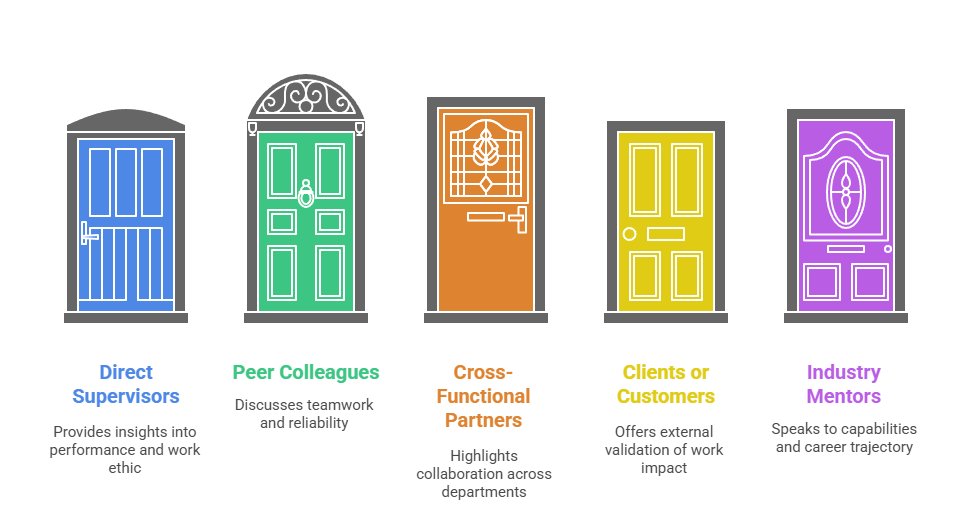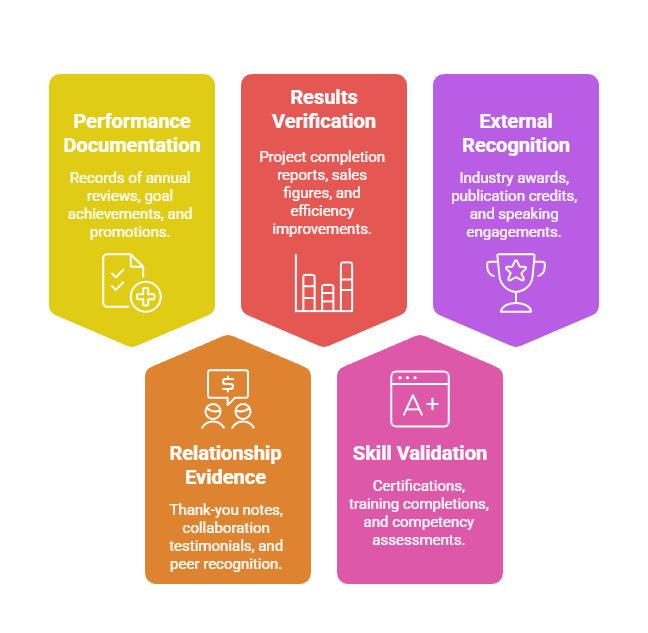Bad employment references can derail promising job opportunities, but they're not insurmountable obstacles. With strategic preparation, legal knowledge, and proactive communication, you can effectively neutralize negative references and maintain career momentum.
Key Takeaways
- Conduct reference checks on yourself before job searching to identify potential negative feedback and prepare targeted responses.
- Federal and state laws, including the FCRA, provide legal protections against false or defamatory employment references that you can leverage.
- Proactive communication with hiring managers about challenging past employment situations demonstrates transparency and professionalism.
- Building a strategic reference list with diverse professional contacts can minimize the impact of one problematic reference.
- Documentation of your work performance, achievements, and positive feedback creates a counternarrative to negative references.
- Employers who provide factually inaccurate references can face legal consequences, giving you recourse options.
- Most companies now limit references to basic employment verification due to litigation concerns, reducing the risk of detailed negative commentary.
Understanding the Reality of Bad Employment References
Bad employment references represent one of job seekers' most anxiety-inducing obstacles in today's competitive hiring landscape. Whether stemming from a personality conflict, performance issues, or circumstances beyond your control, negative references can significantly impact your ability to secure new opportunities. According to 2024 research from the Society for Human Resource Management, 87% of employers conduct reference checks during employment screening processes.
The good news is that poor references are increasingly rare due to legal liability concerns. Most organizations have adopted "neutral reference" policies that limit disclosures to employment dates, job titles, and salary information. However, exceptions existâÂÂparticularly with small businesses, individual supervisors who disregard company policy, or situations involving documented performance problems.
Modern background check processes have evolved beyond simple phone calls. They now include digital verification systems, professional reference checking services, and comprehensive employment screening platforms. These sophisticated tools mean that references can surface in multiple ways throughout your job search, not just during final-stage checks.
Trust is established long before the signing of the offer letter. In HR, I've observed how the simplest decisions in hiring impact directly in culture, confidence, and credibility in ways that no policy ever could. In doing this work with intention, background screening has nothing to do with suspicion and has everything to do with the responsible use of people and purpose. ItâÂÂs actually one of the few times where fairness, consistency, and empathy must intersect. The best HR work I know looks at background screening not just as procedure, but as a responsibility to all parties.
Strategy 1: Conduct Pre-Emptive Reference Audits
Taking control of your reference situation starts with understanding what former employers actually say about you. This proactive approach eliminates guesswork and provides concrete intelligence for developing your response strategy. Reference audits reveal both problems and opportunities you can leverage during your job search.
Perform DIY Reference Checks
Before submitting applications, invest time in discovering what former employers actually say about you. Have a trusted friend or professional contact call your previous employers posing as a potential hiring manager conducting a reference check. This reconnaissance mission provides invaluable intelligence about what information is being shared.
During these test calls, your proxy should ask standardized questions that typical employers use. These include eligibility for rehire, job performance assessment, reason for departure, strengths and weaknesses, and overall recommendation. Document everything verbatim, including the reference's tone, specific phrases used, and any information that seems exaggerated or false.
Strategy 2: Know Your Legal Rights and Protections
Understanding the legal framework surrounding employment references empowers you to take action when former employers cross legal lines. Both federal and state laws provide significant protections against false, defamatory, or maliciously negative reference statements. Knowing these protections transforms you from a passive victim into an informed advocate for your professional reputation.
Understanding FCRA Protections
The Fair Credit Reporting Act provides significant protections when employers use third-party background check companies for employment screening. Under FCRA regulations, you must receive written notice before a reference check and provide written authorization. Additionally, you must receive a copy of any consumer report used in adverse employment decisions.
| FCRA Right | Protection Provided |
| Pre-Adverse Action Notice | Opportunity to review and dispute negative information before final rejection |
| Dispute Process | Ability to challenge inaccurate reference information through the reporting agency |
| Employer Obligations | Companies must provide copies of background reports and contact information for screening agencies |
| Correction Rights | Background check companies must investigate disputes and correct errors within 30 days |
These protections create opportunities to address bad employment references before they permanently damage your candidacy. When you receive adverse action notification, immediately request complete copies of all background screening materials.
State Defamation and Blacklisting Laws
Beyond federal protections, many states have enacted laws specifically addressing employment references and workplace defamation. At least 16 states provide qualified immunity for employers who give honest, good-faith references. Simultaneously, they make employers liable for knowingly false or recklessly made statements.
Some states like California have strong anti-blacklisting statutes. These laws prohibit former employers from preventing you from obtaining new employment through malicious reference statements. Understanding your state's specific laws empowers you to take action when references cross legal lines.
Defamation in the employment context occurs when a former employer makes false statements that damage your reputation and career prospects. If a reference includes fabricated performance issues, false accusations of misconduct, or misrepresentations about your departure circumstances, you may have grounds for legal action. Consultation with an employment attorney specializing in workplace defamation can help you assess whether pursuing legal remedies is appropriate.
Strategy 3: Build a Strategic Reference Portfolio
Creating a diverse, strategic reference portfolio represents one of your most powerful tools for neutralizing negative references. This approach ensures hiring managers receive multiple positive data points about your professional capabilities. A well-constructed reference portfolio demonstrates your ability to build strong relationships across various professional contexts.
Diversify Your Reference Sources
Don't rely exclusively on direct supervisors or formal managers from problematic employers. Instead, cultivate a diverse reference portfolio including colleagues, clients, vendors, cross-functional partners, and supervisors from successful employment periods. This strategic approach minimizes the impact of any single negative reference.
Your reference portfolio should include these key categories that speak to different aspects of your professional capabilities:

- Direct Supervisors: Managers from positive employment experiences who can speak to performance and work ethic
- Peer Colleagues: Co-workers who collaborated with you and can discuss teamwork and reliability
- Cross-Functional Partners: Professionals from other departments who worked with you on projects
- Clients or Customers: External stakeholders who benefited from your work
- Industry Mentors: Established professionals who know your capabilities and career trajectory
This diversified approach provides hiring managers with multiple data points about your professional capabilities. When one reference source proves problematic, the weight of positive feedback from other credible sources creates a more balanced picture.
Provide Context-Appropriate References
Strategically match references to specific job applications based on relevant experience and relationships. For technical positions, emphasize references who can speak to your hard skills and project contributions. For management roles, prioritize those who witnessed your leadership capabilities and team development skills.
Maintain an active reference management system that tracks which contacts you've used for which applications. Note when they were last contacted and what specific strengths they can address. Before each job application, reach out to selected references to refresh their memory about your collaboration and inform them about the specific role.
Strategy 4: Master Proactive Communication Strategies
Transparency about challenging employment situations demonstrates maturity, self-awareness, and integrity that many hiring managers value. When you know negative references exist, address the situation directly with prospective employers before they discover issues independently. This proactive approach allows you to control the narrative, provide context, and demonstrate growth.
Frame past employment challenges using the situation-action-result methodology that focuses on learning and growth. Briefly explain the situation without excessive negativity or blame. Describe actions you took to address issues and emphasize results or lessons that improved your professional capabilities. For example: "I had a challenging relationship with my manager at Company X due to differing communication styles. This experience taught me to adapt my approach and seek feedback more proactively, which has significantly improved my performance in subsequent roles."
| Scenario | Communication Approach |
| Performance Issues | Acknowledge specific challenges, explain contributing factors objectively, demonstrate concrete improvements |
| Personality Conflicts | Focus on learning better interpersonal skills, emphasize subsequent successful relationships |
| Company Restructuring | Provide factual context about organizational changes, emphasize valued contributions |
| Short Tenure | Explain legitimate reasons, highlight accomplishments achieved, show pattern of longer tenures elsewhere |
This transparent approach actually strengthens your candidacy by demonstrating emotional intelligence and professional growth. Research from Leadership IQ found that 46% of newly hired employees fail within 18 months, with 89% failing due to attitudinal issues rather than skills deficits.
Strategy 5: Document Everything and Build Your Counter-Narrative
Tangible documentation of your professional accomplishments creates a powerful counter-narrative to negative references. This evidence-based approach shifts conversations from subjective opinions to objective facts. Strong documentation also provides legal protection if you need to challenge false or defamatory statements.
Create a Professional Achievement Portfolio
Combat potential negative references by assembling comprehensive documentation of your professional accomplishments and positive feedback. This portfolio should include performance reviews, achievement awards, thank-you emails from colleagues or clients, and project completion reports. These tangible artifacts create a compelling counter-narrative that hiring managers can weigh against vague negative references.
Organize your achievement portfolio to address common reference concerns directly:

- Performance Documentation: Annual reviews, goal achievement records, promotion letters, performance improvement completions
- Relationship Evidence: Thank-you notes from colleagues, collaboration testimonials, peer recognition awards
- Results Verification: Project completion reports, sales figures, efficiency improvements, cost savings documentation
- Skill Validation: Certifications, training completions, professional development records, technical competency assessments
- External Recognition: Industry awards, publication credits, speaking engagements, professional association involvement
This documentation serves multiple purposes throughout your job search. During interviews, you can reference specific achievements to preempt concerns about negative references.
Leverage LinkedIn and Professional Recommendations
Build a robust LinkedIn profile with numerous recommendations from diverse professional contacts that serve as public, verifiable references. These written testimonials create a permanent record of positive professional relationships that hiring managers often review. Request recommendations strategically from supervisors, colleagues, clients, and other contacts who can speak to different aspects of your capabilities.
When requesting LinkedIn recommendations, provide specific guidance about what to emphasize. Rather than generic requests, mention particular projects, skills, or achievements you'd like highlighted. For example: "Would you be willing to write a LinkedIn recommendation focusing on our successful product launch collaboration? Specifically, it would be helpful if you could mention my project management skills and ability to coordinate cross-functional teams." This targeted approach generates substantive testimonials rather than vague endorsements.
When to Address References Directly vs. Work Around Them

Knowing when to confront problematic references versus implementing workaround strategies requires careful assessment of your situation. Direct confrontation works best when dealing with factual inaccuracies or policy violations. Workaround strategies prove more effective when references involve subjective opinions or personality conflicts that can't be easily resolved.
Situations Requiring Direct Reference Confrontation
Sometimes addressing problematic references directly proves more effective than avoidance strategies. If your former employer is providing factually inaccurate information, violating company policy, or making potentially defamatory statements, direct intervention becomes necessary. Begin with a professional letter to the HR department documenting specific inaccuracies and citing company reference policies.
Your direct communication should include factual documentation, policy citations, legal framework mentions, professional tone, and paper trail creation. Factual documentation includes specific instances of inaccurate information being provided. Policy citations reference company handbook provisions limiting reference information. Legal framework mentions include FCRA compliance obligations and state defamation laws. Professional tone means firm but respectful language focused on resolution. Paper trail includes certified mail delivery and copies of all correspondence.
In many cases, formal letters to HR departments quickly resolve reference problems. Most organizations prefer avoiding legal complications and will enforce reference policies once violations are documented.
Strategic Workaround Approaches
When direct confrontation isn't feasible or advisable, implement strategic workarounds that minimize negative reference impact. Use the "no longer with the company" response when applications ask for supervisor contact information. Many former managers have indeed moved on, making this technically accurate. Provide HR department numbers rather than direct supervisor contacts, ensuring references go through formal channels.
Another effective workaround involves using the problematic employer's reference strategically rather than avoiding them entirely. If applications require references from all recent employers, list the company but provide alternative contacts like sympathetic colleagues or different department managers. When hiring managers receive positive references from the company despite your concerns, it actually strengthens your position.
Turning Reference Challenges Into Career Advantages
Every obstacle in your job search presents an opportunity to demonstrate desirable professional qualities that many candidates lack. Bad employment references, when handled skillfully, showcase resilience, problem-solving abilities, self-awareness, and integrity. Hiring managers encounter countless candidates with perfect-appearing backgrounds who lack genuine depth.
Transform reference challenges into compelling narrative elements that illustrate professional development. Discuss how difficult employment experiences taught you valuable lessons about communication, performance management, cultural fit assessment, or conflict resolution. Share concrete examples of how you've applied these lessons in subsequent roles with measurably better outcomes. This narrative arcâÂÂchallenge, learning, growth, application, resultsâÂÂcreates a memorable story that hiring managers remember favorably.
Consider how reference challenges might actually benefit your long-term career trajectory. The experience of managing negative references develops skills in reputation management, strategic thinking, communication, and professional networking. You're learning to advocate for yourself, document your value, build diverse professional relationships, and navigate complex interpersonal dynamics. These capabilities serve you throughout your career advancement journey.
Conclusion
Bad employment references create real obstacles but don't represent insurmountable career barriers when addressed strategically. By conducting pre-emptive reference audits, understanding your legal protections, building diverse reference portfolios, and communicating proactively, you can effectively neutralize negative references. Most employers understand that not every professional relationship ends positively. They value candidates who demonstrate self-awareness, growth, and resilience over those claiming perfect track records.
Frequently Asked Questions
Can you overcome a bad employment reference?
Yes, you can absolutely overcome a bad employment reference through strategic preparation and proactive communication. Most hiring managers understand that professional relationships don't always end positively and value candidates who demonstrate growth from challenging experiences. By building a strong portfolio of positive references, documenting your achievements, and addressing concerns transparently, you can effectively minimize the impact of negative references. Your legal rights also provide protection against false or defamatory statements.
Should you warn candidates about negative references?
From an employer perspective, HR professionals should not provide advance warnings about negative references, as this could be construed as interference with the hiring process. However, job seekers should absolutely conduct their own reference audits to identify potential problems before applications. If you're a reference provider with concerns, the most professional approach is declining to serve as a reference rather than agreeing and then providing negative feedback. Alternatively, limit comments to factual employment verification information only.
How do you verify if a reference is telling the truth about you?
Conduct professional reference checks on yourself using trusted contacts who pose as hiring managers, or hire specialized reference checking services. These audits reveal the specific information being shared, tone and emphasis used, and any factual inaccuracies that need addressing. Documentation from these verification efforts becomes crucial if you need to dispute inaccurate information or pursue legal remedies. Services typically cost $50-$200 and provide detailed reports.
What can former employers legally say in references?
Former employers can legally provide truthful, factual information about your employment, including job performance, attendance, reason for departure, and eligibility for rehire. However, they cannot make false statements, share confidential information, or provide opinions presented as facts without reasonable basis. Most companies limit references to employment verification (dates, title, salary) due to defamation liability concerns. Employers who provide knowingly false information can face legal consequences under defamation and employment law.
How long do bad references affect your job search?
The impact of bad references diminishes significantly over time as you build subsequent positive employment experiences and professional relationships. Generally, references from positions held more than 5-7 years ago carry less weight with hiring managers who focus on recent performance. You can accelerate this timeline by actively building new positive references, documenting achievements in current roles, and addressing the problematic situation proactively. Emphasizing professional growth since the challenging employment period also helps.
Can you sue a former employer for giving bad references?
Yes, you can sue a former employer for providing defamatory references that contain knowingly false statements or reckless disregard for truth. To establish a viable defamation claim, you must prove the reference made false factual statements (not opinions), communicated them to third parties, and caused measurable damage to your reputation or career prospects. Consult an employment attorney specializing in workplace defamation to assess your specific situation. These cases require substantial evidence and vary by state law.
What should you do if you receive adverse action notice after a background check?
Immediately request complete copies of all background screening materials from the reporting agency identified in the notice. Review the information carefully for inaccuracies, then submit formal disputes with supporting documentation to the background check company within the specified timeframe. The screening company must investigate your dispute and correct any information they cannot verify. If the adverse action was based on inaccurate reference information, providing documentation of errors can potentially reverse the employment decision.
How many professional references should you maintain?
Maintain a strategic portfolio of 8-12 diverse professional references across different categories including direct supervisors, peer colleagues, clients, and cross-functional partners. This depth provides flexibility to select the most appropriate 3-5 references for specific job applications while having backup options if primary contacts become unavailable. Regularly maintain these relationships through periodic contact and professional networking. Keep references informed about your career progression so they can provide current, relevant testimonials when needed.
Additional Resources
- Understanding Your Rights Under the Fair Credit Reporting Act
https://www.consumer.ftc.gov/articles/pdf-0096-fair-credit-reporting-act.pdf - SHRM Guide to Background Checks and Employment Screening
https://www.shrm.org/resourcesandtools/tools-and-samples/toolkits/pages/employmentbackgroundchecks.aspx - State Laws on References and Statements by Former Employers
https://www.nolo.com/legal-encyclopedia/free-books/employee-rights-book/chapter9-6.html - How to Request and Review Your Employment Background Check Report
https://www.consumer.ftc.gov/articles/0157-employment-background-checks - Professional Reference Checking Services Comparison Guide
https://www.forbes.com/advisor/business/software/best-background-check-services/

GCheck Editorial Team
Meet the GCheck Editorial Team, your trusted source for insightful and up-to-date information in the world of employment background checks. Committed to delivering the latest trends, best practices, and industry insights, our team is dedicated to keeping you informed.
With a passion for ensuring accuracy, compliance, and efficiency in background screening, we are your go-to experts in the field. Stay tuned for our comprehensive articles, guides, and analysis, designed to empower businesses and individuals with the knowledge they need to make informed decisions.
At GCheck, we're here to guide you through the complexities of background checks, every step of the way.






